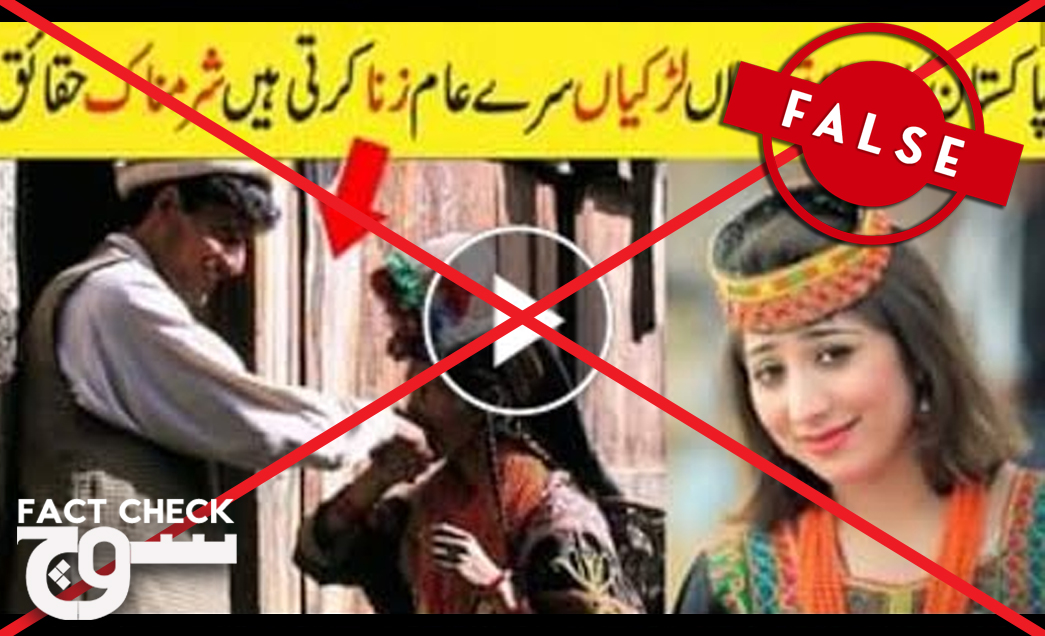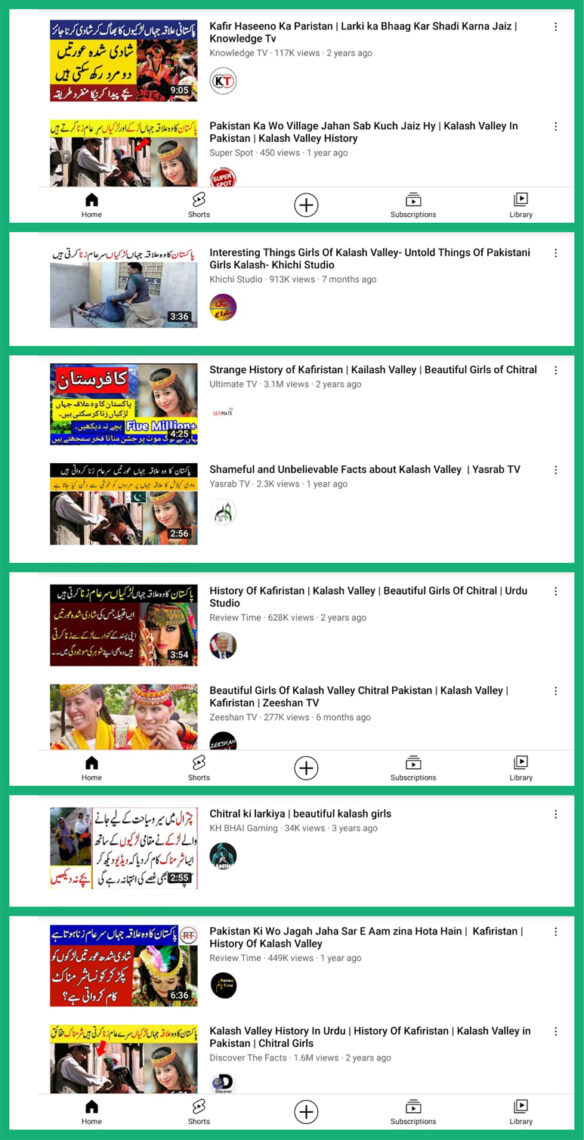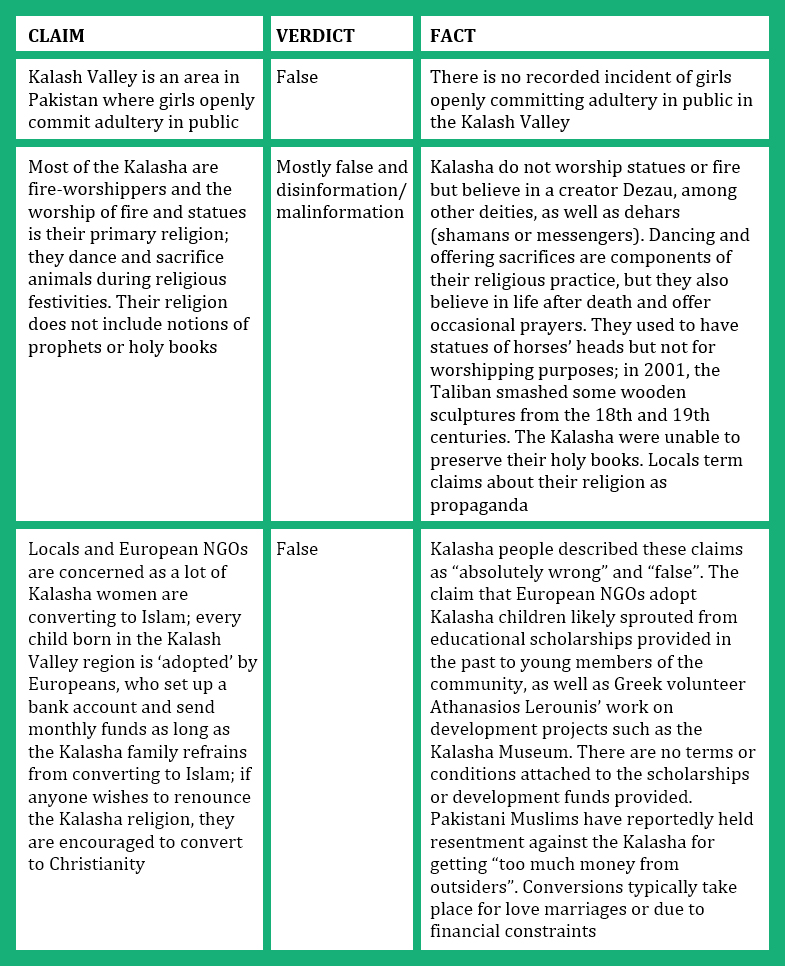
Claims:
1. The Kalash Valley is an area in Pakistan where women openly commit adultery in public
2. The Kalasha are fire-worshippers and their primary religion is the worship of fire and statues; they dance and sacrifice animals during religious festivities; their religion does not include notions of prophets or holy books
3. NGOs are concerned as a lot of Kalasha women are converting to Islam. In addition, every child born in the Kalash Valley is ‘adopted’ by Europeans, who set up a bank account and send monthly funds in return for a promise that the child’s family will not convert to Islam; if anyone wishes to renounce the Kalasha religion, they may convert to Christianity but if they convert to Islam they lose access to the funds
Fact: These three claims are false and constitute harmful disinformation and hate speech against the Kalasha community. Such disinformation creates prejudice against minority communities in Pakistan.
On 25 August 2021, a video about the Kalasha community that lives in remote mountain valleys in Pakistan’s Chitral district emerged on Facebook. This video contained various sensational and dubious claims about the indigenous community that forms one of the smallest minority populations in Pakistan.
The video, first posted on a Facebook page titled ‘Dr Shabana’ and archived here, was captioned as follows:
“پاکستان کا وہ علاقہ جہاں لڑکیاں سرعام سے زنا کرتی ہیں ۔ ۔ ۔ انتہائی شرم ناک حقائق کیلاشی لوگوں کے۔”
“The area of Pakistan where girls openly commit adultery. The most embarrassing facts about the Kalash people.”
The ‘About’ section of the ‘Dr Shabana’ page links to a website called ‘Leak HD News’, which was established in 2021. The video clip garnered hundreds of thousands of views and reactions in a short period of time and was separately posted here, here, here, here, here, here, and here.
Soch Fact Check investigated the claims in the video by referring to research carried out earlier and speaking to two members of the Kalasha community and locals of Chitral.
Soch Fact Check interviewed Luke Rahmat, a young blogger from Chitral Kalasha Desh, and Najeeb, another member of the Kalasha community whose paternal grandfather converted to Islam.
Marriage and relationships
According to our sources, there is no recorded practice of women openly committing adultery in the Kalash Valley.
However, according to a report by the National Commission for Human Rights (NCHR) on indigenous people’s rights, there have been instances where “inappropriate behaviour of the tourists” has made it difficult for the Kalasha people to practice their religion and freely observe cultural practices, including seasonal festival celebrations. The commission’s chairperson, Justice (R) Ali Nawaz Chowhan, said in his letter in the aforementioned report that “unwilling conversions and cajoled marriages with non-Kalash” and intolerance towards minorities are some of the biggest threats to the community.
Tribal elders have also expressed concern that Muslim men divorce their newly-converted Kalasha brides shortly after marriage, leaving them without any social and financial security. It is likely that this issue, as well as the fact that the community has different customs surrounding marriage, has fuelled the allegations of adultery.

Caption: Screenshots of YouTube videos, which have hundreds of thousands of views, spread propaganda that puts the Kalasha community in danger, and remain published on the social media platform.
“There are oral marriage agreements and not [through] nikkah-nama,” Luke said, but clarified that it’s not like anyone can go to a local festival, express their liking for a girl, “take her hand, pick her, and marry her”.
Luke lamented the negativity being spread about the community, which causes fear and leads to unpleasant and irresponsible tourism in the region. “We see everyday how tourists with this mindset come to Kalash,” he said, terming it “alarming and unfortunate.”
NGO funding, ‘adoption’ claims
Claims of European NGOs’ involvement in the Kalasha community — especially those linking funding to promises about religion — are “absolutely wrong” and “false,” Luke and Najeeb explained.
They further clarified that conversions to Islam do take place, though not for reasons relating to any kind of foreign funding. It’s by their choice and willingness and “no one forces them”, Najeeb said.
Luke said there have been conversions “but only for love marriages” or due to financial constraints. The claim that European NGOs adopt Kalasha children at birth is “propaganda,” he said, adding that if the assertion were true, the “Kalasha wouldn’t be living in poverty.”
“No European says that nor have I heard something like this. We’re Pakistanis and we have jobs like everyone else. I’m surprised at how such claims are spread without research and [are] pre-planned conspiracies and propaganda to discourage the youth [and are an attempt] to remove the community [from existence],” he said. “Misunderstandings are created and dishearten the Kalasha youth.”
Propaganda relating to NGO funding may be rooted in resentment toward the Kalasha for receiving outside support, harboured by many Pakistanis. Luke spoke about Athanasios Lerounis, an NGO worker with Greek Volunteers (GVs) who used to “work on development projects such as the Kalasha Museum and secured educational scholarships for some children of the community.”
In 2011, The Guardian reported that Kalasha Dur Museum’s “detractors say that the exclusion of Muslims from the school only adds to the resentment felt by those who feel that the Kalash get too much money from outsiders.” This school is part of the museum “built by the NGO Greek Volunteers, with help from Greece’s government body Hellenic Aid.”
While such initiatives may have formed the basis for propaganda about NGO funding, Luke stressed that there has never been any agenda in place to prevent conversions to Islam. Najeeb also denied the claim that European NGOs set up bank accounts for newborns in the community, describing as mere “rumours” such assertions. “If it was correct, their [Kalasha’s] lives would have improved by now,” he said.
Religion and beliefs
Both Luke and Najeeb denied claims made about the Kalasha belief system, terming them “absolutely wrong” and “lies.”
Luke said: “The Kalasha people believe in the creator Dezau and Mulawa, [which are two of the] 29 different names of god. It is not okay to say they’re fire-worshippers or animists. It’s clear that we believe in one god, one creator.”
“Since it’s said there were 124,000 messengers, no one can determine what their names were or who they were sent to. We have 27 dehars, or messengers who are also called shamans [but] we’re not behind a specific one,” Luke said. “We believe in life after death, the evidence of which is the Madaik ritual on 15 December for the departed souls. There’s silence in temples and pine nut candles [are lit] in remembrance [of the souls as we] believe the souls are alive.”
Luke explained that in the Kalasha religion there are no routine prayers but occasional ones offered during festivals and sacrifices. Prayers and sacrifices may be offered at high-altitude altars in the Kalasha Valley, homes, and temples.
“Juniper and grapevines are considered to be holy and are used in prayers,” Luke said, adding that the claim that the Kalasha people worship fire or statues is “propaganda […] used to misguide people.”

Conclusion: Most of the claims are misleading or false and include disinformation and/or malinformation. The Kalasha are an indigenous people who have a unique culture, religion, and traditions. They have existed since long before Pakistan came into being and face multiple threats due to being a minority group living in an area that is considered one of the country’s top tourist destinations.
